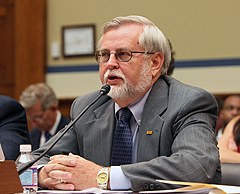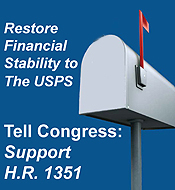Guffey Asks, Who’s the ‘We?’
June 15, 2011
Testifying before a House panel on June 15, APWU President Cliff Guffey began by taking issue with the title of the hearing, “Postal Infrastructure: How Much Can We Afford?”
“A key point to bear in mind is that the ‘we’ in this question is postal customers, not taxpayers,” Guffey told the Subcommittee on Federal Workforce, U.S. Postal Service and Labor Policy. [full testimony] 
The union president pointed out that the Postal Service receives no subsidy from the federal government, only payment for services rendered. Since the establishment of the U.S. Postal Service as an independent agency in 1970, postal rates have risen at about the pace of inflation, Guffey noted.
Faced with a financial crisis, the Postal Service “can and must expand its services to fill needs emerging because of digital communications,” he said, instead of cutting the retail and mail processing network.
The hearing was called by Subcommittee Chairman Dennis Ross (R-FL), an outspoken critic of the USPS, to “focus on the extent that these networks need to be right-sized to meet diminishing mail volume.”
“We strongly urge postal policy-makers, both inside the Postal Service and elsewhere in government, to think creatively about how the Postal Service should be adapting its retail services to meet society’s current needs,” Guffey said. “It would be tragic to dismantle the postal retail infrastructure and lose an opportunity to maintain it and improve the delivery of government services.”
A Need for Change
Guffey also said consolidation of the mail processing network often impedes service to postal customers, and directly affects postal workers. Since 1999, the equivalent of 174,306 full-time jobs have been eliminated in APWU bargaining units.
The APWU has recognized the need for change in response to reduced mail volume and changes in the mail mix, Guffey said, and he pointed out that the new Collective Bargaining Agreement provides the USPS increased workforce flexibility, and includes innovative provisions that will permit management to provide retail services at lower costs.
However, the union has actively resisted the consolidation of many mail processing operations, the union president said. “In many cases, we have found that cost savings have been over-estimated and that actual potential cost savings cannot justify the adverse service impacts of the changes.”
It is also difficult to accurately gauge the needs of the mail processing network because mail volume is constantly in flux, Guffey said. Despite the USPS overall reduction of work hours, overtime pay has increased — which shows that the Postal Service needs its current employees. “The Postal Service cannot reduce the workforce more rapidly without significantly harming service performance,” he said.
A Necessity
Instead of closing post offices solely for financial reasons, Guffey urged lawmakers to support legislation that would permit the USPS to partner with other government agencies to more efficiently deliver government services and provide sufficient economic justification to maintain a postal presence in rural and economically disadvantaged communities.
“The Post Office provides a unique public service that is still a necessity for many people,” he pointed out. “It is a focal point of many small communities; it is ‘where the flag flies;’ it is where the government provides support for the community.
APWU members are encouraged to contact their legislators and urge them to support legislation such as H.R. 1351, that would correct the USPS financial crisis — without slashing service. “APWU members must make legislative action a priority,” he said. Contact Your Legislators and check out the H.R. 1351 Co-sponsors.



